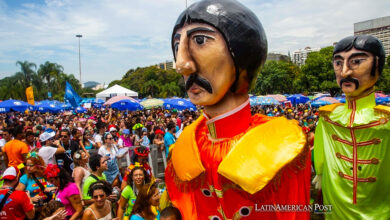Peasants and indigenous people join protests in Ecuador
The state of exception continues in Ecuador despite rising unemployment, and different sectors, including indigenous communities, have risen against the government .

Farmers join protests in Ecuador. / Photo: twitter.com/CONAIE_Ecuador
LatinAmerican Post | Juliana Suárez
Listen to this article
Leer en español: Campesinos e indígenas se unen a protestas en Ecuador
Due to increases in gasoline, several sectors of the country, led by transporters, had entered into a National Unemployment, which led to President Moreno's decision to decree a state of emergency to restore citizen security.
48 hours of protests that led to the arrest of more than 350 people, violent conflicts between authorities and protesters and even injured journalists, the transporters decided to lift the strike. Although on Friday, October 4, they had said that the protests would not cease until the government removed the decree that eliminated the subsidy of gasoline, they announced on the night of that same day that they would withdraw from unemployment because they had already expressed their disagreements with the government and they had nothing else to do.
Today, days after the chaos began both in cities and in rural areas, different sectors remain united against gasoline, which has led to other demands being made.
President Moreno has been firm that he will not dialogue with those who do not have serious proposals and are open to reaching agreements that benefit the country. He even said that the measure has been to stop benefiting the people without "going to blackmail" who he also called "smugglers."
¡Estoy decidido a cambiar el país! A que se sancione a quienes saquearon el dinero del pueblo, a que se controlen los precios y se castigue a los especuladores, pero también a dialogar y tender la mano a la gente decente.#DecididosACrecer #EcuadorPaísDePaz pic.twitter.com/JKO7ykh6uC
— Lenín Moreno (@Lenin) October 7, 2019
Among the groups that have united against the decision, peasant leaders and indigenous communities have raised their voices. On the one hand, the peasants have come together because they affirm that the increase in gasoline implies a direct impact on the transport of their products, which arrive throughout the country. According to BBC Mundo, a peasant leader in the rural community of Molleturo said "that if the government did not repeal decree 883, which ended four decades of fuel subsidy, they would not end the protest."
Also read: Crisis in Ecuador: Why was the state of emergency declared?
Protests in this rural way and in others the streets were taken and protesters threw stones to prevent the passage of cars as a sign of protest. As a result, some rural areas were isolated for days as the different groups blocked the roads. The same peasant leader, Manuel Pacheco, affirmed while the demonstrations happened that "the president (Lenín Moreno) says that the increase in fuel does not affect us, but if we have to mobilize from Molleturo to Cuenca (provincial capital) the trip leaves us two dollars, now we will have to pay 5, but if we take to sell a chicken, they will not pay us twice".
Indigenous communities from different regions of the country have also joined these disagreements. After the lifting of the strike by the transporters, indigenous leaders reaffirmed their commitment to the National strike and asked to continue with the protests until the decree is revoked.
According to the BBC, “CONAIE, the largest indigenous center in the country, announced in a statement on Saturday its own" state of emergency "in the ancestral territories and warned that it will retain members of law enforcement who approach their domains".
Decreto Estado de Excepción en territorio indígena del Ecuador ante la brutalidad de las fuerzas militares.
Militares y policías que se acerquen a nuestros territorios serán retenidos y sometidos a justicia indígena.#SomosCONAIE#LaLuchaVaPorqueVa pic.twitter.com/mqAW6RSmrn
— CONAIE (@CONAIE_Ecuador) October 5, 2019
Thus, these communities have blocked the steps with stones and tires. In the communiqué of the confederation they affirm that the self-declared state of exception is given to the "lack of awareness of the public force to understand the popular nature of the demands of the national strike against the Paquetazo".
In the first days of the week, indigenous groups have mobilized from different regions to Quito, where they will meet on Wednesday 10 to protest against the government. President Lenin Moreno wanted to talk with indigenous groups but they refused and called to meet and demonstrate.
Estoy decidido a dialogar con los hermanos indígenas, con quienes compartimos causas. Hablemos sobre cómo usar los recursos para los más necesitados. ¡Estoy decidido a cambiar el país, pero necesito que tú también lo estés!#DecididosACrecer #EcuadorPaísDePaz pic.twitter.com/DdEcHCHy6N
— Lenín Moreno (@Lenin) October 7, 2019
For their part, the transporters affirmed that, having not been able to reach agreements with the government, there should be a revision in the ticket prices, since the current cost would not cover the increases. This rise in the passages would affect a large part of the Ecuadorian population, which is why so many sectors joined the protests.
Other sectors will join the mobilization on Wednesday, especially trade union movements and opposition members




